
Interstitial Cystitis
Interstitial cystitis is a chronic, painful bladder condition that affects millions of Americans. People with IC have discomfort and pain in the bladder and pelvic area caused by inflammation in the bladder walls. This patient guide explains IC symptoms, diagnosis, treatment and tips for living with this chronic condition.
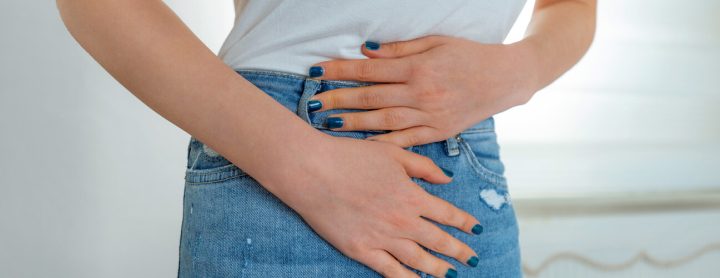
Interstitial cystitis can affect people of all ages, backgrounds and racial groups, but more adults than children get IC. According to the National Institute of Diabetes and Digestive Kidney Diseases, IC is more common in women than men.
Severe IC symptoms can affect quality of life and get in the way of daily activities. It’s important to see a medical professional such as a urologist or urogynecologist to rule out other conditions with similar symptoms, such as urinary tract infections.
While there is no cure for IC, the right treatment can help people with IC manage symptoms and improve quality of life.
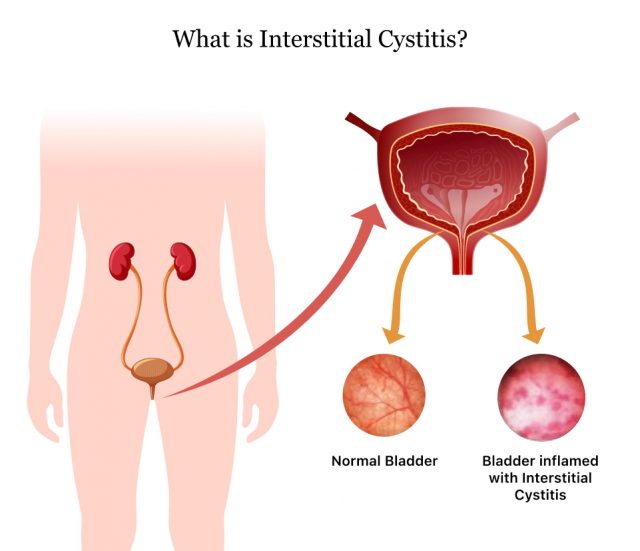
Symptoms
Symptoms of IC manifest differently from person to person. For example, symptoms in women may get worse right before their periods. Stress may also make symptoms more severe.
“IC begins primarily with [urinary] frequency and is intermittent in most patients with symptom flares associated with sexual activity. Pain and urgency incontinence tend to be later symptoms.”
Over time, the bladder may become scarred or stiff from inflammation. This makes it difficult for the bladder to fill with urine and bladder walls may bleed as it tries to expand.
Typically, common symptoms include bladder pain, discomfort or urinary urgency. Severe symptoms such as painful sexual intercourse, difficulty exercising or travel hesitancy can interfere with daily activities.
- Urinary urgency during the night and day
- Pain, pressure or tenderness in the pelvis, bladder and perineum that may increase when the bladder fills with urine
- The bladder doesn’t hold as much urine as it used to
- Painful sexual intercourse
- Pain in the penis or scrotum in men
- Pelvic floor muscle spasms in women
What Does IC Pain Feel Like?
Pain with pressure is the most common sign of IC. IC pain feels different for everyone, but the pain often gets worse as the bladder fills. It may be dull, stinging or burning.
In addition to the bladder, IC pain may affect the lower back, lower abdomen or pelvic area. Men may feel pain in the penis, scrotum or testicles and women may feel pain in the vagina or vulva.
Complications
IC symptoms can lead to complications and reduced quality of life. Complications are physical and emotional.
Like other people with chronic pain or illness, people with IC may struggle with depression, anxiety and difficulty sleeping.
- Difficulties with sexual intercourse
- Intimacy avoidance
- Avoiding traveling or exercise
- Painful pelvic exams and Pap tests in women
- Bladder scarring and bleeding
- Reduced bladder capacity
- Sleep loss
- Anxiety
- Depression
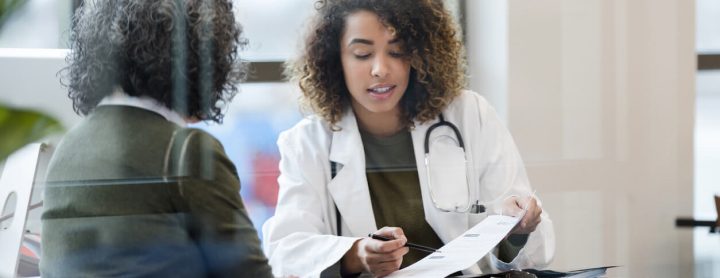
Diagnosis
Currently, no definitive test shows if someone has IC or not. Instead, medical providers diagnose IC based on information on symptoms, a physical and neurological examination and some bladder tests.
The most common misdiagnosis is a urinary tract infection, according to Dr. C. Lowell Parsons, a professor and IC expert at the University of California, San Diego Medical Center.
- Symptoms
- How severe symptoms are
- How long a person has had symptoms
- What is the patient’s family and medical history
- Medications a patient is taking, over-the-counter and prescription
- How much and what kind of liquids a person drinks
- How symptoms affect daily activities
Physical Exam
In order to rule out other conditions and search for potential causes of symptoms, medical providers will conduct a physical and neurological exam.
For men, the exam will include the rectum, prostate and abdomen. For women, the exam will include the abdomen, rectum and organs in the pelvic area.
Doctors may also check a patient’s mental health because some people with IC have anxiety or other mental disorders occurring along with IC symptoms.
Other Tests
In addition to physical exams, patients will fill out a questionnaire about the level of pain they experience. This is called a baseline pain value.
The provider may also perform a voiding test. This is a test to measure how often you urinate. People with IC urinate more often and have lower volumes of urine each time they void.
Urodynamic Evaluation
This test measures bladder pressure as the bladder is filled with water through a catheter. People with IC have a small capacity for liquid and there may be pain as the bladder is filled.
Cystoscopy
In this test, the health care provider will look inside the bladder with a special tool. While examining the inside of the bladder, the doctor can check for cancer, bladder stones or ulcers. He or she will also be able to take a bladder biopsy. A person with IC symptoms and ulcers most likely has IC.
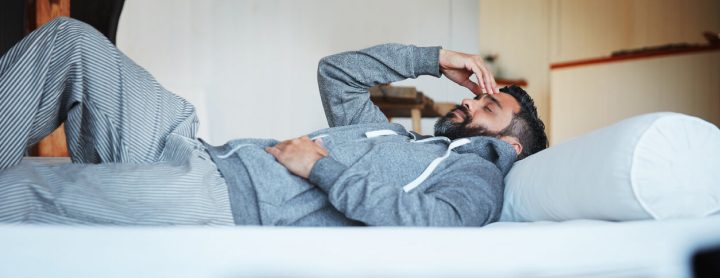
Causes
No one knows exactly what causes IC. Researchers theorize that people with IC have a damaged bladder wall. This allows irritants from urine to leak into the bladder lining, causing pain and discomfort.
A few factors may lead to the development of the condition, according to the Interstitial Cystitis Association. These involve damage to the bladder or its lining.
- Pelvic floor problems
- Autoimmune disorders
- Trauma to the spinal cord
- Defective bladder lining
- Inflammation or hypersensitivity of the pelvic nerves
- Overdistension of the bladder, such as when people hold their urine for too long
- Trauma or injury to the bladder (from surgery or other injury)
Does a History of Abuse Cause IC?
The link between IC and sexual and physical abuse is controversial. Studies show mixed results, some show no connection, while others show a high rate of abuse among people with IC. So far, the medical community has not reached a consensus, according to the Interstitial Cystitis Association.

Treatment
Unfortunately, there is no cure for IC, and it doesn’t go away. It can go into remission for a long time, but symptoms may return.
The best treatment for IC varies from person to person. Sometimes, there may be a little trial and error involved in finding the best IC symptom relief. It’s important that patients be open and honest with their doctors about their experience and symptoms.
Treatment options for IC include lifestyle changes, medications, therapy and surgery.
Lifestyle Changes
Changes in behavior, diet and exercise are the first line of IC therapy. These changes can lessen symptoms.
Some patients see improvement in tenderness and pain after manipulative pelvic floor therapy. These exercises are different from Kegel exercises which are not recommended for people with IC.
While mental and emotional stress doesn’t cause IC, it can make symptoms worse. Patients can get counseling to help with strategies to deal with mental and emotional stress.
- Tomatoes
- Chocolate
- Coffee
- Alcohol
- Caffeine
- Spicy food
- Carbonated drinks
- Citrus
FDA-Approved Prescription Medications
If symptoms are still too bothersome after making lifestyle changes, doctors may recommend prescription drugs.
Elmiron (Pentosan Polysulfate Sodium)
Elmiron is the only oral medication approved by the Food and Drug Administration to treat the symptoms of IC. It’s been on the market since 1996. Researchers think the drug works by creating a barrier in the damaged bladder wall and preventing irritants from reaching the lining.
Common Elmiron side effects include stomach pain, nausea and diarrhea. In June 2020, the drug’s maker added a warning to the drug label that long-term use is linked to a degenerative eye disease called pigmentary maculopathy. This condition may get worse even after stopping the drug and may lead to long-term vision loss.
Dimethyl Sulfoxide (DMSO)
Doctors administer dimethyl sulfoxide (DMSO), another FDA-approved IC drug, directly into the bladder through a catheter. Therapy usually lasts six weeks. Researchers think the drug works by blocking inflammation and pain sensations.
Side effects include a garlic-like odor and pain when placing DMSO into the bladder.
Neuromodulation, Injections and Ulcer Cauterization
If drugs and lifestyle changes don’t provide enough relief, neuromodulation, injections and ulcer cauterization are the next options.
Neuromodulation passes electrical impulses into the nerves to help deal with pain. Botox injections may help with pain, but they may cause difficulty passing urine. Research published in 2022 showed an injection combination of heparin and lidocaine is effective for pain. Doctors may cauterize bladder ulcers and the procedure may provide relief for up to a year or more.
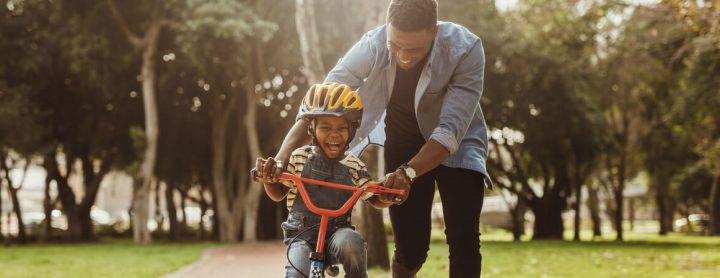
Living with IC
Living with IC can be difficult. Because there is no cure for IC, eating well and managing health is an important way to fend off flare-ups. Planning ahead for travel and other activities can make daily life easier as well.
The Interstitial Cystitis Foundation has some tips for eating, exercise and travel.
| Food Type | Least Bothersome | Most Bothersome |
|---|---|---|
| Fruits | Bananas, blueberries, apricots, dates, honeydew, watermelon, prunes, pears, raisins | Bananas, blueberries, apricots, dates, honeydew, watermelon, prunes, pears, raisins Cranberry juice, citrus fruits and juice, pineapple juice and fruit, strawberries |
| Vegetables | Asparagus, avocados, Brussel sprouts, cabbage, celery, cucumber, eggplant, mushrooms, potatoes (all types), peas, radishes, spinach, turnips, squash, zucchini | Tomatoes and tomato products, pickles, sauerkraut, chili peppers |
| Grains | Rice, oats | None |
| Proteins | Pork, poultry, lamb, nuts, eggs, fish, shrimp, beef, nuts | Processed meats, soy |
| Dairy | Mild cheeses, milk | Yogurt |
| Condiments | Herbs, garlic, olive oil | Horseradish, chili, salad dressing, vinegar, soy sauce, ketchup, Worcestershire sauce |
| Beverages | Grain beverages, coffee substitutes, water | Coffee, carbonated drinks, alcohol, tea |
| Other Foods | Popcorn, pretzels | Chocolate, pizza, Thai food, Mexican food, Indian food, spicy food, artificial sweeteners, monosodium glutamate (MSG) |
Helpful Supplements and Foods
Some studies have found some supplements useful for IC symptoms and flares. Some vitamins, minerals and antioxidants may be helpful in conjunction with other medications and treatments.
Make sure you discuss any supplements with your doctor before taking them.
- Vitamin C
- Vitamin D
- Iron
- Prebiotics/Probiotics (supplements or foods such as asparagus, garlic, leeks, oats, bananas, sourdough, kefir, milk enriched with probiotics)
- Omega 3 Fatty Acids (supplements or foods such as milk, eggs, fish, beans, kale, parsley, squash, spinach)
- Antioxidants (supplements or food such as apples, artichokes, broccoli, dates, pears, pumpkins, yams, watermelon, greens, apricots, blueberries)
Fitness and Exercise
Exercise is beneficial to the body. For people with IC, having good blood flow to the bladder and having good support muscles for organs is extra important.
Exercising with IC may be challenging, but sticking to more gentle, low-impact exercises can help symptoms. Avoid any jarring movements, heavy straining or excessive stretching. Always make sure to check with your doctor before trying any type of exercise.
- Yoga
- Low impact aerobics
- Pilates for IC
- Walking
- Tai Chi
Travel Tips
People with IC face travel challenges, especially those with severe disease. Urinary urgency and worries about finding bathrooms make travel difficult. But a little planning can make it easier.
- Don’t travel during peak seasons
- Research the restrooms along your travel route
- Restrict fluids before and after flights and arrange for an aisle seat
- Take a portable potty or bedpan in the car
- Wear absorbent pads (women) or condom catheters (men) when traveling where restroom access might be restricted
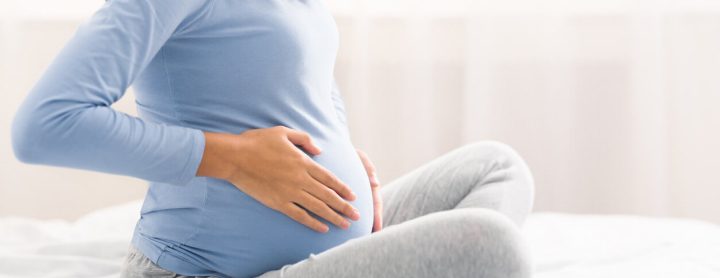
Interstitial Cystitis and Pregnancy
There isn’t much research about how IC affects pregnancy. Available research shows that patients who experienced moderate symptoms before pregnancy did not have an increase in pain. They only had a slight increase in urinary urgency, according to the Interstitial Cystitis Association.
Treating IC during pregnancy can be more difficult because certain medications may not be safe to take while pregnant. Your doctor may recommend discontinuing most medications.
One of the main medications for IC, Elmiron, hasn’t had adequate studies for pregnant women. But in animal studies, it did not impair fertility or harm the fetus.
Gentle exercise and physical therapy may help keep pregnant women with IC comfortable.
Make sure you talk to your doctor if you become pregnant or plan to become pregnant. Your doctor can help you plan for pregnancy and giving birth.
Calling this number connects you with a Drugwatch representative. We will direct you to one of our trusted legal partners for a free case review.
Drugwatch's trusted legal partners support the organization's mission to keep people safe from dangerous drugs and medical devices. For more information, visit our partners page.


